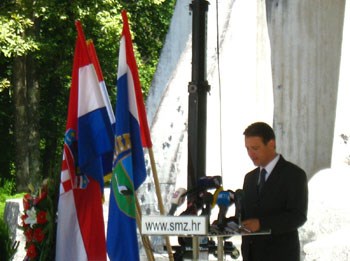- Published: 22.06.2011.
Deputy Prime Minister and Minister of Foreign Affairs and European Integration Gordan Jandroković participated in the commemoration ceremony of the Anti-Fascist Struggle Day held in the Brezovica forest near Sisak on Wednesday, 22 June 2011 on behalf of Pr
In congratulating those present at the commemoration ceremony of the Anti-Fascist Struggle Day, Minister Jandroković recalled that with the establishment of the first armed anti-fascist unit in the forest of Brezovica, on today's date in 1941, one of the biggest anti-fascist resistance movements in occupied Europe emerged
In congratulating those present at the commemoration ceremony of the Anti-Fascist Struggle Day, Minister Jandroković recalled that with the establishment of the first armed anti-fascist unit in the forest of Brezovica, on today's date in 1941, one of the biggest anti-fascist resistance movements in occupied Europe emerged. This movement placed Croatia among the victorious nations, members of the anti-fascist coalition. He pointed out that the values advocated and promoted by this movement form the basis of today's democratic Croatia and Europe.As Minister Jandroković pointed out with great pleasure, this year the Republic of Croatia had for the first time been included among the victorious nations of the Second World War which the Yad Vashem Holocaust Museum invites to commemorate the Day of Victory over Fascism in Israel. This is an additional mark of recognition for Croatian anti-fascism as well as an achievement of the Croatian national policy and diplomacy that persevere in transmitting the full truth about Croatian history, said Minister Jandroković.
The minister went on to say that anti-fascism, as a general hallmark of modern civilisation, is built into the foundations of the Republic of Croatia and, consequently, its values as well as decisions of the National Anti-Fascist Council of 1943 constitute the historical foundations of the Croatian Constitution as the highest ranking political and legal act.
Victory over fascism and nazism marks a watershed in the history of Europe. It also underpins the idea of a united Europe that is a community of free and democratic countries, which, as such, constitutes a first-rate achievement of our civilisation, said Minister Jandroković and added that it was at the end of the 20th century, within the framework of the sovereign and democratic Croatian state, built and fought for in the Homeland War, that the Croatian people finally saw these values brought to life.
Recalling that the 20th-century Croatian history was marked by fierce disagreements and controversy, the Minister went on to say that these divisions had nevertheless been overcome through reconciliation and unity achieved during the Homeland War and defence against the Greater Serbian aggression. Without this unity and reconciliation, also advocated by the first Croatian president and founder of the Croatian state, an anti-fascist fighter himself, Franjo Tuđman, there would not be a Croatian state, said Minister Jandroković. He added that Croatia's future is to be built on strong European foundations. In this sense, every totalitarian regime is to be strongly condemned and every form of extremism dismissed.
Today’s Croatia is standing up to the past in a mature way, which is also supported by the Croatian Parliament's decision to start commemorating August 23 as the Day of Remembrance for the Victims of All Totalitarian and Authoritarian Regimes, in line with the 2009 European Parliament resolution. This is homage to all the victims of totalitarian and undemocratic regimes, and constitutes a precondition for reconciliation and true unity of modern-day Europe, said the Minister.
He also recalled that Croatia is in the final stages of a long and demanding negotiation process with the European Union. By becoming a member of NATO and the European Union, the goal of creating an independent and democratic state will have been achieved. As a soon-to-be 28th member of the community of European peoples, Croatia will become part of a project that emerged from the rubble of post-war Europe.
The Republic of Croatia, as well as the other European countries, is founded on the principles of freedom, rule of law, justice, respect for human and minority rights, tolerance and social market economy. These are the values that Croatia also promotes through its foreign-policy activities. Thus, in addition to fostering good-neighbourly relations with all its neighbouring countries, Croatia is contributing to the expansion of a zone of peace and stability in this part of the European continent. Precisely by opting for a European future in modern-day Europe which is founded on anti-fascism and the fight against every form of totalitarianism, modern-day Croatia pays respect to its own anti-fascist heritage and confirms its adherence to universal values of peace, freedom and justice, concluded Minister Jandroković.



